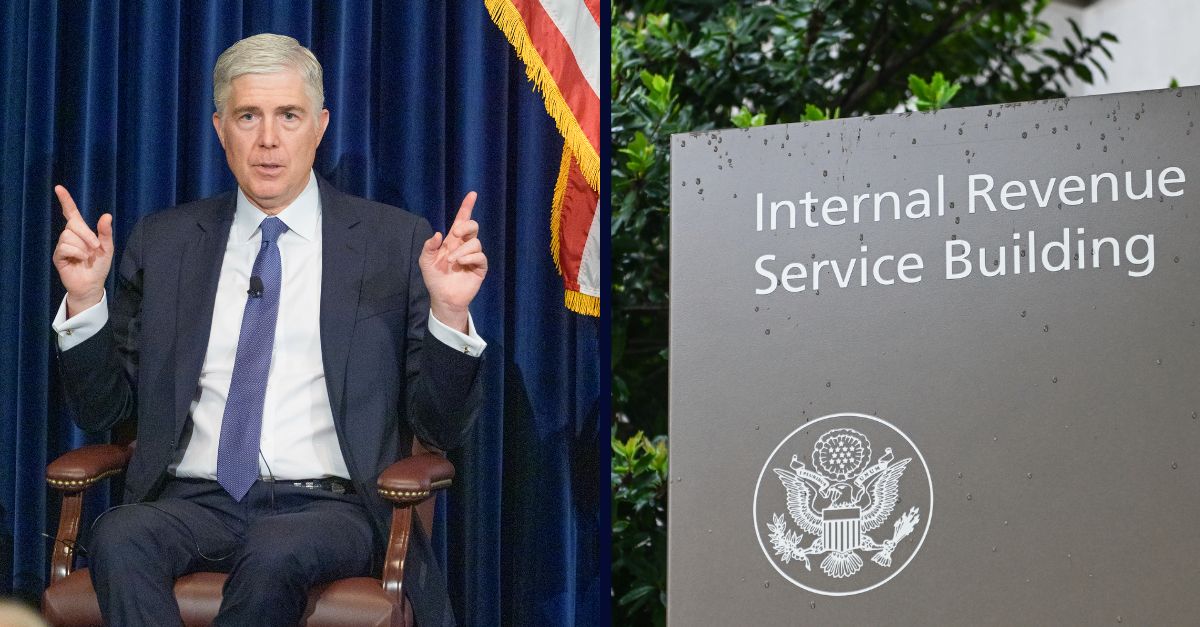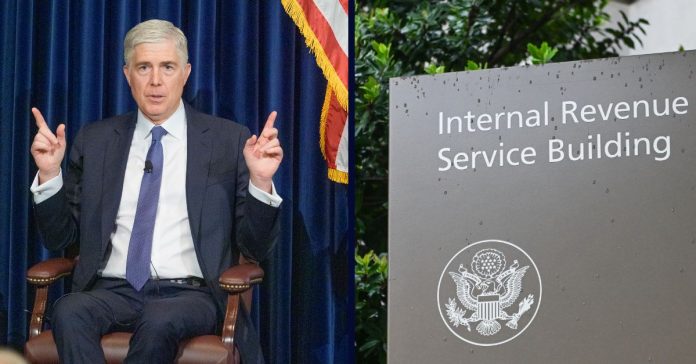
Left: U.S. Supreme Court Associate Justice Neil Gorsuch speaks at the Ronald Reagan Presidential Library Foundation in Simi Valley, Calif., on Aug. 8, 2024 (AP Photo/Damian Dovarganes). Right: A sign outside the Internal Revenue Service building in Washington, D.C., United States, on May 28, 2025 (Photo by STR/NurPhoto via AP).
Lone dissenter Justice Neil Gorsuch was unnerved Thursday that his colleagues at the U.S. Supreme Court issued an 8-1 decision that he believes amounts to endorsing a “roadmap” and a “powerful new tool” for escaping accountability in U.S. Tax Court when the agency makes mistakes affecting everyday Americans.
The majority opinion, authored by Justice Amy Coney Barrett, concluded that a New Jersey woman’s long-running case, indeed, hit a roadblock because the IRS declared it was no longer trying to use a levy to seize her home and sell it to resolve her alleged tax liabilities.
As Barrett recounted, Jennifer Zuch’s clash with the IRS began in 2012 when she and her husband at the time belatedly filed a tax return for 2010. What came next was a legal morass, wherein Zuch’s attempt to resolve what she allegedly owed only led to the levy threat from the IRS.
The court’s syllabus recounted the early events of the case, noting that Zuch’s then-husband made a payment specifically to “resolve her liability” and that this payment was instead applied to his bill:
The dispute here began in 2012, when Jennifer Zuch and her then-husband Patrick Gennardo each filed an untimely 2010 federal tax return. Gennardo subsequently submitted an offer in compromise to resolve outstanding tax liabilities. This offer implicated $50,000 in estimated tax payments that the couple had previously sent to the IRS; following the offer, the IRS applied these payments to Gennardo’s account. For her part, Zuch later amended her 2010 tax return to report additional income, which resulted in an additional $28,000 in taxes due. But Zuch maintained that the IRS should have credited the couple’s $50,000 payment to her account, entitling her to a $22,000 refund. The IRS disagreed and sought to collect her unpaid taxes by placing a levy on her property pursuant to its authority under 26 U.S.C. §6331(a).
In Barrett’s words, a “procedural twist” followed. While Zuch was appealing the threatened levy in Tax Court, she overpaid her taxes in years that followed, leading the IRS to drop the balance owed to $0 and leading the agency to stop pursuing the levy.
The Tax Court then declared the case moot and moved to dismiss Zuch’s case for lack of jurisdiction, even though she “still disputed the debt that prompted the levy” and even though “she hoped that a victory before the Tax Court would force the IRS to refund her overpayments,” the Supreme Court summarized.
On Thursday, the majority decided that Zuch was out of luck when it came to pursuing a refund through the Tax Court for a simple reason: Because there was no more levy threat, there was no more jurisdiction. As such, Zuch must continue wrangling in the courts for a refund through a separate “postdeprivation suit,” adding even more time and expense to a decade-long dispute.
All of this clearly left Gorsuch uneasy as he sorted through the potential implications for everyday Americans who encounter the IRS in an aggressive posture.
“Like many Americans, Jennifer Zuch wound up owing money on her taxes. When the Internal Revenue Service told her that she had failed to pay all she owed for 2010, her (then) husband responded by paying the bill. But instead of applying that payment to resolve her liability, the agency used the money to satisfy her husband’s separate tax debt,” Gorsuch began. “The agency did so even after Ms. Zuch’s husband insisted the money was meant for her tab, not his. Then, because it deemed Ms. Zuch’s liability still outstanding, the agency sought to seize and sell her property in a levy.”
Gorsuch noted that the IRS’s reason for dismissing Zuch’s case as moot did not arise because the agency had “admitted its mistake in crediting her husband’s payment to the wrong account.”
“Instead,” the justice said, “the agency told the court, it had determined that Ms. Zuch overpaid her taxes in later years, and it had decided to keep (rather than refund) those overpayments to satisfy her (disputed) 2010 debt.”
Gorsuch declined to embrace a framework he called “a trap for the unwary,” whereby the IRS could threaten to seize an ordinary person’s home, and then, several years later, “drop the levy and avoid an unfavorable ruling on the taxpayer’s underlying tax liability” when convenient — leaving taxpayers similarly situated to Zuch to deal with the grind of a separate refund lawsuit.
In Gorsuch’s view, the majority’s blessing here handed the IRS “a powerful new tool to avoid accountability for its mistakes in future cases like this one.”
“The short of it all is this,” Gorsuch warned. “The IRS seeks, and the Court endorses, a view of the law that gives that agency a roadmap for evading Tax Court review and never having to answer a taxpayer’s complaint that it has made a mistake.”

